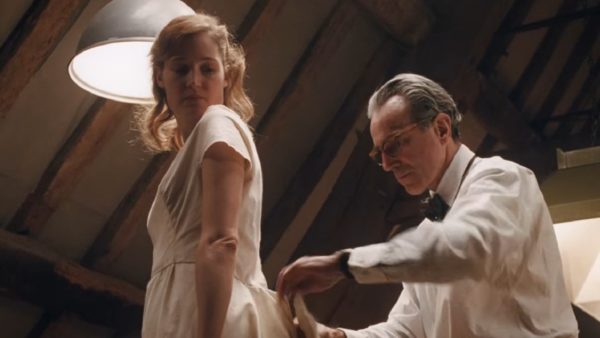At Filmhouse Cinema, Edinburgh now
Paul Thomas Anderson directs a romantic comedy about a spoiled man-child? You would be excused if you were to think this refers to the 2002 Adam Sandler feature, Punch-Drunk Love. Rather what we have here is this hypnotically elegant character piece. To call it a comedy is probably pushing it, but there are elements of the darkest comedy crafted within the fabric of this elusive, moody drama.
Daniel Day-Lewis is wonderfully cold and mysterious as the pernickety perfectionist Reynolds Woodcock. A dressmaker who crafts the most beautiful, elegant and high-end dresses suitable for the rich and famous. Set within his home and work station in 1950’s London, he shares his life with two women. One being his sister Cyril (a powerhouse of quiet restrained resentment by Lesley Manville) and his latest muse, Alma (Vicky Crieps). Whilst it is down to Cyril to ensure the beautiful home life and business is set out exactly the way that Reynolds needs for his creativity to be at the fore, Alma’s presence seems to bring out the best in his work. Alma, however is not one to be so easily shunned aside when the time comes and proves herself to be a little more adept at manipulation than the innocent young waitress she initially appears to be.
This is very much a three-hander film. None of the characters are particularly likeable but the enjoyment comes from the swiftly manoeuvring status changes throughout the film. The three leads are fantastic, if this is indeed Day-Lewis’ final film he has left us with a very memorable character. Manville steals every scene she appears in and Crieps gracefully handles the trickier role and holds her own against these two heavyweights. There’s also a couple of fun smaller roles in the cast from the likes of Harriet Sansom Harris and Julia Davis.
The film sits well alongside Anderson’s previous character driven chamber pieces, There Will Be Blood and The Master. Again, there is an absorbing, rhythmic score from Johnny Greenwood which perfectly evokes the mood of the film. Anderson’s camerawork elegantly sways around the dresses and feasts lovingly on the craftsmanship of out protagonist’s work. Just as the film seems to be running out of thread (ha!), Anderson switches gears for a final chapter that will no doubt cause much discussion. Just as with the two films mentioned previously, it’s the type of ending that if the IMDb discussion boards were still up and running would have many posters arguing over and claiming their own interpretation.
Phantom Thread is a cold film, and may not initially have you blown away, despite the talent on show and those beautiful dresses (and the Oscar for Costume Design goes to….) but it is a film that stays with you for a long time afterwards. And just as the characters are drawn back to each other, for better or worse, the likelihood of returning for a second fitting is highly likely.
